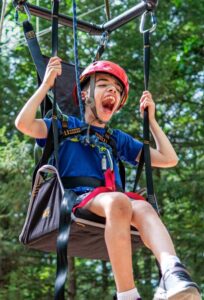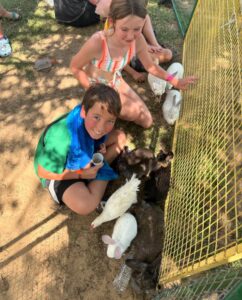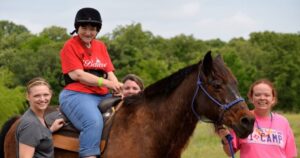January is Human Trafficking Prevention Month: Part 2 By: Justice Venture International [As we start the new…
[This month, we are celebrating Disability Pride Month and wanted to feature a short series focused on our partners who are daily working with children with disabilities. Last year, the Foundation was honored to fund 19 different grantees working in youth disability care. This article is written by our own program officer CJ Stevenson, who had the chance to visit three different camps focused solely on serving children who face physical, cognitive, and developmental challenges].
Barrier-Free Access to Camping is Life-Changing
By CJ Stevenson, Program Officer
As a child I didn’t attend summer camp until junior high when I loaded up on a bus with my youth group for church camp. To be honest, I don’t remember where the camp was or its name, but what I do remember is the experiences – catching my first fish on a cane pole, capture the flag, evening worship – and the closeness I felt to God. I was privileged in this experience. Privileged that my church sent us to camp, privileged that my parents could afford to send me, and privileged that I don’t have a disability that would exclude me from the opportunity.
The lessons that one gains from summer camp are invaluable. For many it’s their first time away from their parents for an extended amount of time, which means much deserved respite for parents. It’s an opportunity to try new things – like fishing for me! And it’s a great way to form friendships and experience different personalities (and learn soft skills in dealing with those personalities in close proximity).
However, for a portion of our population, accessing camp is a little more complicated. For our friends with disabilities – whether it be physical, cognitive or medical – there are camps designed to give barrier-free access to all kinds of amazing experiences. This summer I was able to visit three terrific organizations that afford everything we love about camp to children with disabilities.
Joni & Friends
Joni & Friends, a national organization with a Texas chapter, hosts three family retreats at Camp Allen in the Piney Woods of Navasota, Texas. Joni & Friends family camps are unique in that the entire family is able to attend. Each child or adult with a disability is matched with a volunteer buddy for the entire week to do activities with. This gives parents and siblings much deserved respite and the opportunity to have new experiences of their own. The camp has structured worship and Bible study each day led by thoughtful individuals. Children experience Bible theater and are able to participate in the Bible story of the day complete with barrier-free costumes. During the day there are traditional camp experiences like horseback riding and pool time, and in the evenings there is a dance, a talent show and even a date night for parents.
Texas. Joni & Friends family camps are unique in that the entire family is able to attend. Each child or adult with a disability is matched with a volunteer buddy for the entire week to do activities with. This gives parents and siblings much deserved respite and the opportunity to have new experiences of their own. The camp has structured worship and Bible study each day led by thoughtful individuals. Children experience Bible theater and are able to participate in the Bible story of the day complete with barrier-free costumes. During the day there are traditional camp experiences like horseback riding and pool time, and in the evenings there is a dance, a talent show and even a date night for parents.
What I learned during my day spent immersed in the family camp at Joni & Friends was that respite and support are good for the soul. A majority of the families that attend family camp have done so for years – some even decades. Family camp allows them to recharge, reconnect with their spouse, and be reassured that they aren’t alone – both with fellow parents and the Lord’s presence. During the women’s Bible study we discussed the story of Gideon. The message for these mothers is that God has prepared you for this journey of raising a child with a disability even when you feel ill-prepared and ill-equipped. “’Pardon me, my lord,’ Gideon replied, ‘but how can I save Israel? My clan is the weakest in Manasseh, and I am the least in my family.’ The LORD answered, ‘I will be with you…’” – Judges 6:15-16
Camp Sweeney
Camp Sweeney is a specialized camp that focuses exclusively on children and youth with type 1 diabetes. Camp Sweeney is nestled an hour outside of Dallas in Cooke County on several hundred acres. The camp experience is almost identical to a traditional camp – water sports, blaring music at lunch with dancing counselors and cowboy-themed mail delivery, bunk beds and the smell of sunscreen.
 The difference maker rests inside the newly constructed medical center where a team of thr ee attending physicians and scores of medical students work around the clock to carefully process glucose data and recommend real-time insulin doses. Five times per day, a carefully orchestrated glucose test and dosing occurs simultaneously through all of the cabins at camp. During a 20-minute time span campers report to their cabin and take their glucose test while their camp counselors enter the data that is sent in real-time to the medical students in the medical center. The medical students have minutes to review the data and send back the appropriate insulin dosage. Camp counselors then draw the insulin and disseminate it to the campers who administer it themselves. Meanwhile, the kitchen staff customize each camper’s meal or snack to ensure a positive blood sugar balance. Campers then arrive at the mess hall for their food. It was an impressive process to witness.
The difference maker rests inside the newly constructed medical center where a team of thr ee attending physicians and scores of medical students work around the clock to carefully process glucose data and recommend real-time insulin doses. Five times per day, a carefully orchestrated glucose test and dosing occurs simultaneously through all of the cabins at camp. During a 20-minute time span campers report to their cabin and take their glucose test while their camp counselors enter the data that is sent in real-time to the medical students in the medical center. The medical students have minutes to review the data and send back the appropriate insulin dosage. Camp counselors then draw the insulin and disseminate it to the campers who administer it themselves. Meanwhile, the kitchen staff customize each camper’s meal or snack to ensure a positive blood sugar balance. Campers then arrive at the mess hall for their food. It was an impressive process to witness.
What I observed during my time spent at Camp Sweeney was the servant leadership of the camp counselors. These camp counselors have a lot of responsibility that none of them take lightly – the obvious being drawing insulin. But what I witnessed went beyond that. The counselors were deeply engaged with their campers, and put their campers’ needs above their own. They knew their campers on a deeper level, watched over them carefully, and mentored them over the course of the 18-day camp. “I will place shepherds over them who will tend them…” – Jeremiah 23:4
Camp Summit
Camp Summit hosts year-round camp in Paradise, Texas. Everyone is welcome to Camp Summit regardless of ability level, and is the most barrier-free program that I’ve yet to witness. The week-long camp is full of traditional camp experiences – ropes course, fishing, talent show, crafts, and more – but there is a customization to each activity to suit the camper’ needs. The pool – a popular activity with all campers – is retrofitted to accommodate everyone. There are specially-designed wheelchairs that allow non-ambulatory campers to enjoy the pool with their friends.
What I felt during my visit to Camp Summit one balmy summer evening was the sense of inclusion. This emanated from camp counselors, staff and volunteers alike. There is a willingness to do everything possible to make each unique camper feel valued, seen, and welcome. While at the pool party, I watched a team of three counselors and staff seamlessly load a non-ambulatory camper into the special wheelchair and unload him into the pool. The smile on the camper’s face was huge! He was able to enjoy the pool with his friends through this determined act of kindness. “So then, as we have opportunity, let us do good to everyone…” – Galatians 6:10
Looking back on my three visits to each unique camp, I’m filled with gratitude. These camps are life-changing for the campers who are able to attend. Each individual is shaped by their own camping experience and the memories created will last a lifetime – just like that fish I caught on the cane pole.
Share this post:
Category: Grant MakingOriginal Content
January is Human Trafficking Prevention Month: Part 1 By Shellie Velasco, Program Officer [As we start the…
Welcome to 2025 By Adrian Cook, Director of Research & Evaluation “But the steadfast love of the…

